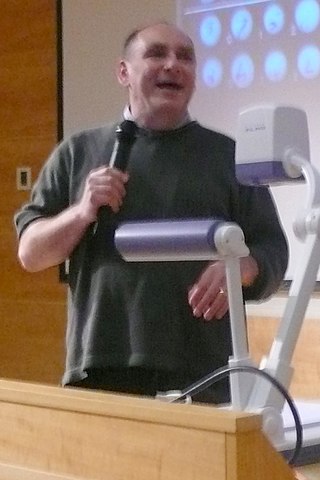
Vinton Gray Cerf is an American Internet pioneer and is recognized as one of "the fathers of the Internet", sharing this title with TCP/IP co-developer Bob Kahn.

Robert Elliot Kahn is an American electrical engineer who, along with Vint Cerf, first proposed the Transmission Control Protocol (TCP) and the Internet Protocol (IP), the fundamental communication protocols at the heart of the Internet.

Van Jacobson is an American computer scientist, renowned for his work on TCP/IP network performance and scaling. He is one of the primary contributors to the TCP/IP protocol stack—the technological foundation of today’s Internet. Since 2013, Jacobson is an adjunct professor at the University of California, Los Angeles (UCLA) working on Named Data Networking.
Transmission Control Protocol (TCP) uses a congestion control algorithm that includes various aspects of an additive increase/multiplicative decrease (AIMD) scheme, along with other schemes including slow start and congestion window (CWND), to achieve congestion avoidance. The TCP congestion-avoidance algorithm is the primary basis for congestion control in the Internet. Per the end-to-end principle, congestion control is largely a function of internet hosts, not the network itself. There are several variations and versions of the algorithm implemented in protocol stacks of operating systems of computers that connect to the Internet.

Srinivasan Keshav is a Computer Scientist who is currently the Robert Sansom Professor of Computer Science at the University of Cambridge.
TCP Vegas is a TCP congestion avoidance algorithm that emphasizes packet delay, rather than packet loss, as a signal to help determine the rate at which to send packets. It was developed at the University of Arizona by Lawrence Brakmo and Larry L. Peterson and introduced in 1994.
Jiawei Han is a Chinese-American computer scientist and writer. He currently holds the position of Michael Aiken Chair Professor in the Department of Computer Science at the University of Illinois at Urbana-Champaign. His research focuses on data mining, text mining, database systems, information networks, data mining from spatiotemporal data, Web data, and social/information network data.
Kanianthra Mani Chandy is the Simon Ramo Professor of Computer Science at the California Institute of Technology (Caltech). He has been the Executive Officer of the Computer Science Department twice, and he has been a professor at Caltech since 1989. He also served as Chair of the Division of Engineering and Applied Science at the California Institute of Technology.
Stefan Savage is an American computer science researcher, currently a Professor in the Systems and Networking Group at the University of California, San Diego. There, he holds the Irwin and Joan Jacobs Chair in Information and Computer Science. Savage is widely cited in computer security, particularly in the areas of email spam, network worms and malware propagation, distributed denial of service (DDOS) mitigation and traceback, automotive hacking and wireless security. He received his undergraduate degree at Carnegie Mellon and his Ph.D. from the University of Washington (2002).

Jonathan Andrew Crowcroft is the Marconi Professor of Communications Systems in the Department of Computer Science and Technology, University of Cambridge, a Visiting Professor at the Department of Computing at Imperial College London, and the chair of the programme committee at the Alan Turing Institute.
Hari Balakrishnan is the Fujitsu Professor of Computer Science and Artificial Intelligence in the Department of Electrical Engineering and Computer Science at MIT, and the Co-founder and CTO at Cambridge Mobile Telematics.
Sally Jean Floyd was an American computer scientist known for her work on computer networking. Formerly associated with the International Computer Science Institute in Berkeley, California, she retired in 2009 and died in August 2019. She is best known for her work on Internet congestion control, and was in 2007 one of the top-ten most cited researchers in computer science.
Kenneth P. Birman is a professor in the Department of Computer Science at Cornell University. He currently holds the N. Rama Rao Chair in Computer Science.
Steven H. Low is a Professor of the Computing and Mathematical Sciences Department and the Electrical Engineering Department at the California Institute of Technology. He is known for his work on the theory and mathematical modeling of Internet congestion control, algorithms, and optimization in power systems.
Kathleen Nichols is an American computer scientist and computer networking expert. Nichols is the founder and CEO of Pollere, Inc, a network architecture and performance company based in California, US. Before founding Pollere, Nichols was VP of Network Science at Packet Design, where she was part of the founding team. Prior to Packet Design she was director of advanced Internet architectures in the Office of CTO at Cisco Systems.
Vishal Misra is an Indian-American scientist at Columbia University, New York, NY and known for his numerous contributions to Computer Networking. He was named Fellow of the Institute of Electrical and Electronics Engineers (IEEE) in 2016 for contributions to network traffic modeling, congestion control and Internet economics. He was elected as an ACM Fellow in 2018. In 2019, he was designated a Distinguished Alumnus of IIT Bombay, from which he graduated in 1992.

Craig Partridge is an American computer scientist, known for his contributions to the technical development of the Internet.

Ashutosh Dutta is a computer scientist, engineer, academic, author, and an IEEE leader. He is currently a Senior Scientist, 5G Chief Strategist at Johns Hopkins University Applied Physics Lab, APL Sabbatical Fellow, Adjunct Faculty and Director of the Doctor of Engineering Program at Johns Hopkins University. He formerly served as the ECE Chair for EP at Johns Hopkins University. He is the Chair of IEEE Industry Connection O-RAN Initiative and the Founding Co-Chair for the IEEE Future Networks Initiative. He also serves as the co-chair for the IEEE 5G/6G innovation Testbed.

Saverio Mascolo is an Italian information engineer, academic and researcher. He is the former Head of the Department of Electrical Engineering and Information Science and the professor of Automatic Control at Department of Ingegneria Elettrica e dell'Informazione (DEI) at Politecnico di Bari, Italy.








